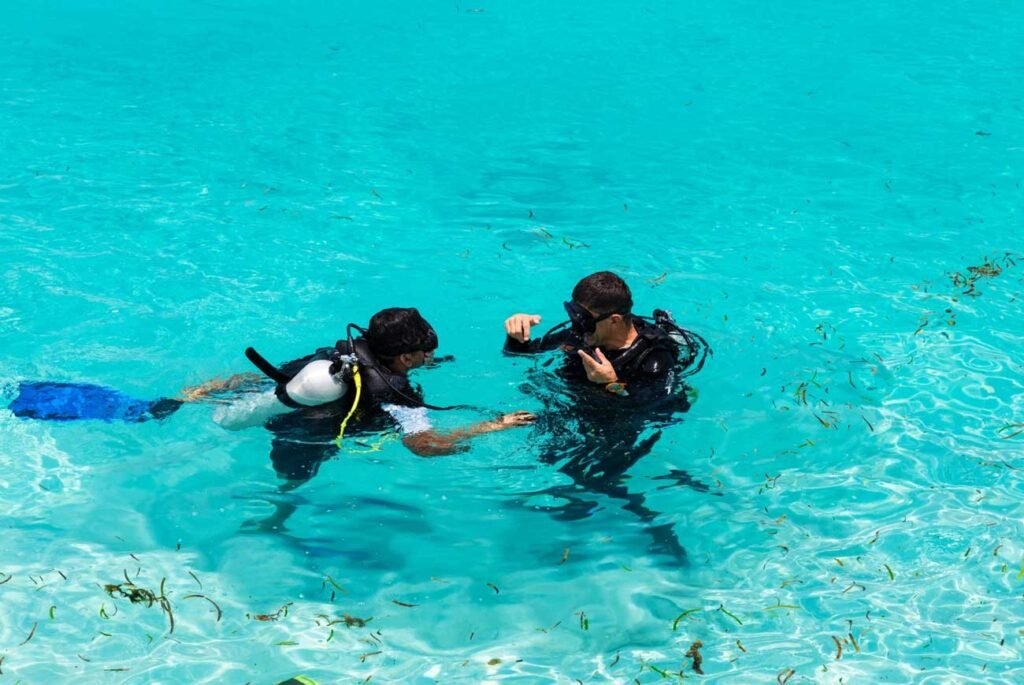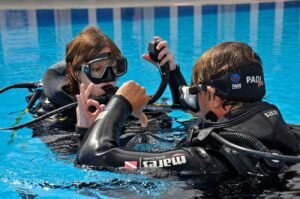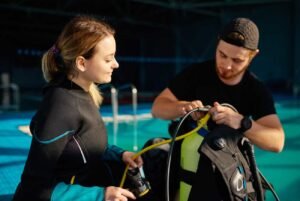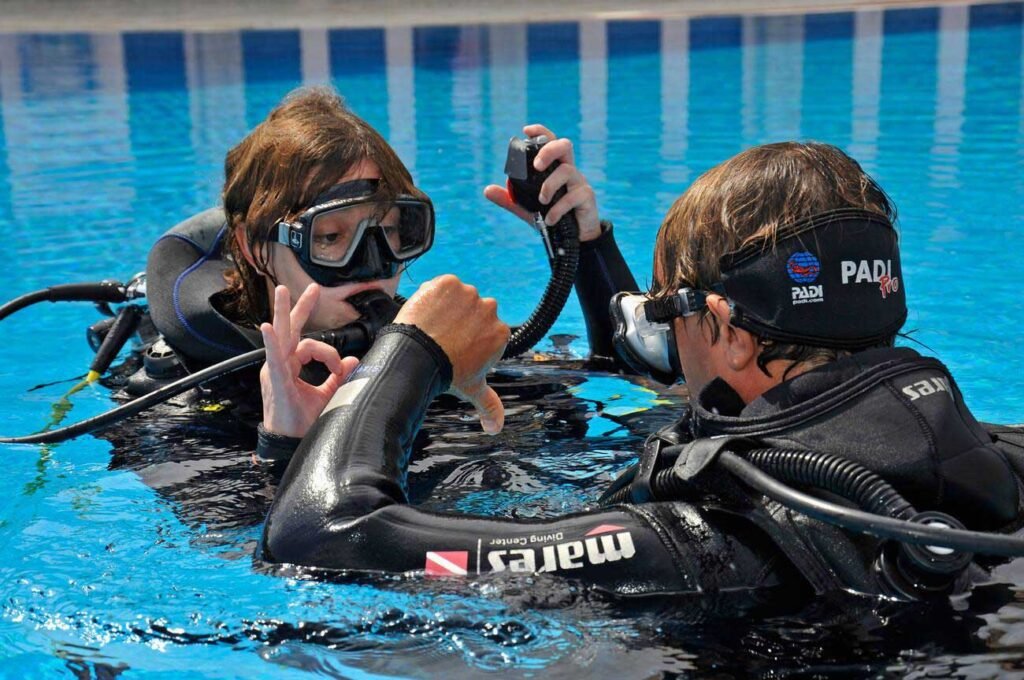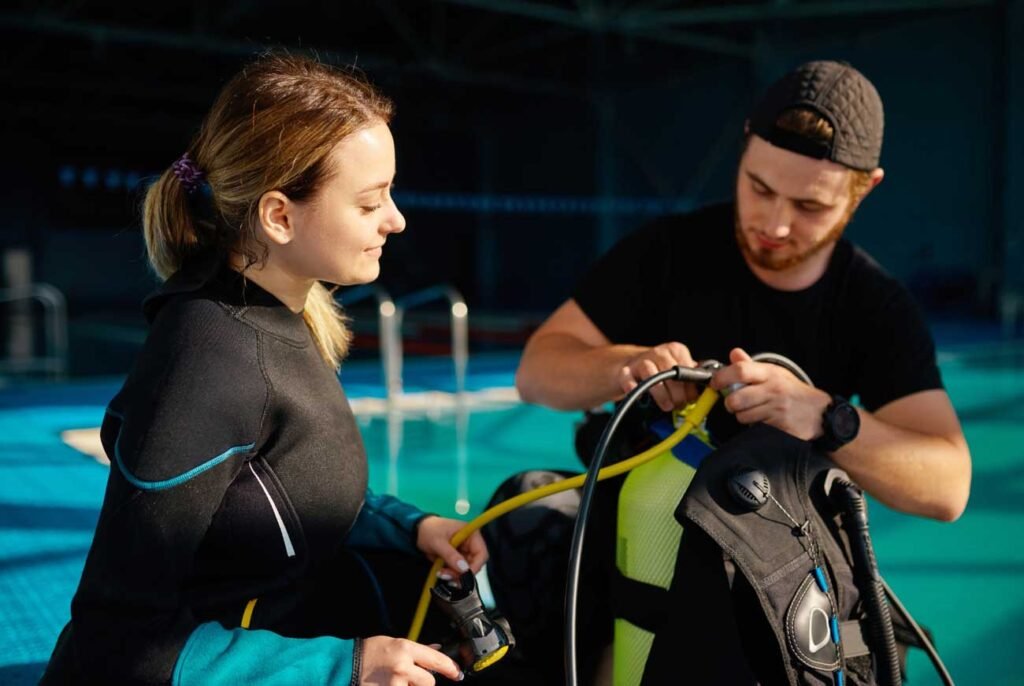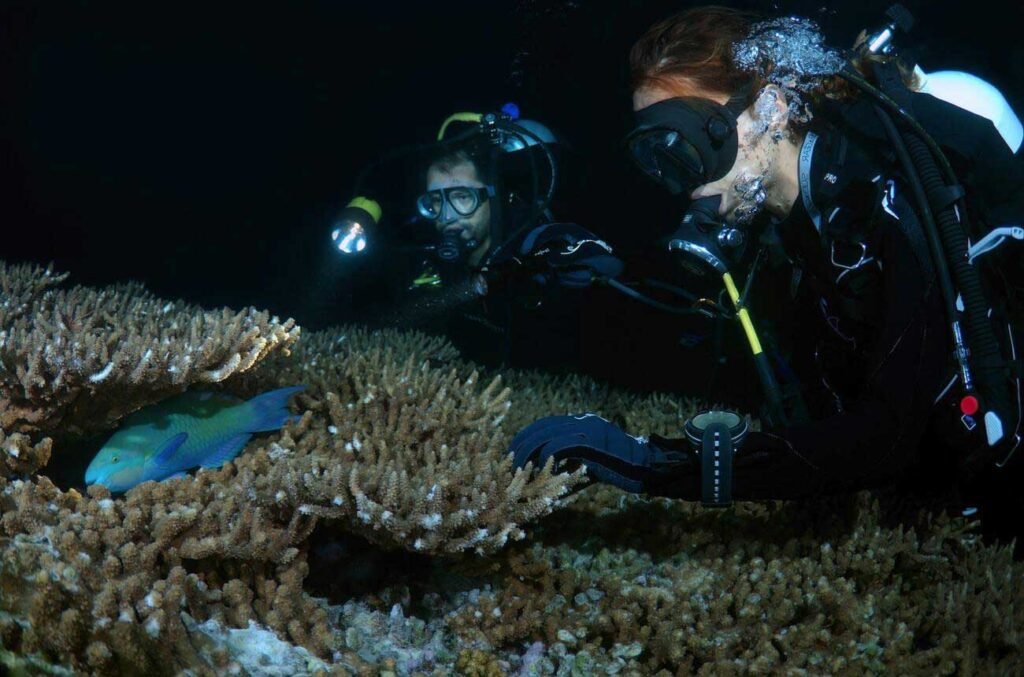Scuba diving opens the door to a world most people only dream of — coral gardens, tropical fish, sunken wrecks, and peaceful underwater moments. But if you’re new to diving, it’s completely normal to feel a little nervous at first. The good news? Scuba diving is incredibly safe when you follow the right guidelines and dive with professionals.
In this guide, we’ll walk you through the essential safety tips every beginner should know before taking that first breath underwater. These aren’t just rules — they’re habits that will make you a more confident, relaxed, and happy diver.
Choose a Reputable Dive Centre
Your safety starts long before you enter the water. One of the most important decisions you can make is choosing a certified, well-reviewed dive centre.
Look for:
- PADI-licensed (or equivalent) dive centres
- Certified instructors with experience in beginner training
- Small group sizes for personalised attention
- Clear safety briefings and well-maintained equipment
At Pearl Divers, for example, we pride ourselves on patient, professional instruction with a focus on safety and comfort — especially for those experiencing the ocean for the first time.
Listen Carefully to Your Pre-Dive Briefing
Before every dive, your instructor will walk you through the plan — including hand signals, gear use, what to expect, and what to do in various situations.
Even if it feels like a lot to take in, pay close attention. This is your chance to build trust in your instructor and equipment. Don’t hesitate to ask questions or ask for something to be repeated — clear communication is the first step to a safe dive.
Always Dive with a Buddy
One of the golden rules of diving is never dive alone. That’s why you’ll always be paired with a buddy — whether that’s another diver or your instructor.
Before the dive:
- Check each other’s gear (BCD, weights, regulator, air)
- Discuss signals and roles
- Stay close underwater so you can support each other if needed
This simple system builds confidence and creates a layer of safety that benefits everyone.
Equalise Early and Often
As you descend, you’ll feel pressure build in your ears. This is completely normal, and it’s easy to fix with gentle equalisation (pinching your nose and blowing gently).
Tips to stay comfortable:
- Start equalising before you even feel discomfort
- Do it frequently — not just once
- If your ears don’t clear, pause or ascend slightly
- Never force it — pain is a sign to stop
Learning to equalise early helps prevent ear injuries and ensures a smoother descent.
Control Your Breathing
It may sound simple, but one of the most important scuba safety tips is:
Never hold your breath.
Always breathe slowly and deeply through your regulator. This helps:
- Prevent lung overexpansion
- Improve buoyancy control
- Keep you calm and relaxed
Practise this during your first training sessions. The slower and steadier you breathe, the better your dive will feel.
Keep an Eye on Your Depth and Air Supply
It’s easy to get mesmerised by the underwater world — but you should always be aware of:
- Your air gauge – Check it frequently. Instructors usually surface with 50 bar (700 psi) or more.
- Your depth – Stay within your training limits. Most beginner dives go no deeper than 12–18 metres.
Your instructor will keep track too, but learning to monitor your own equipment is a valuable habit for every diver.
Ascend Slowly and Safely
A safe ascent is just as important as the dive itself. Never rush to the surface.
Follow these basic rules:
- Ascend no faster than 18 metres per minute (your instructor will guide this)
- Pause for a safety stop at 5 metres for 3 minutes to allow nitrogen to leave your body
- Keep breathing continuously — never hold your breath
These steps reduce your risk of decompression sickness and keep your body safe during the transition back to the surface.
Know Your Limits and Speak Up
One of the best pieces of advice for new divers is this:
It’s okay to say no.
If you’re feeling tired, unsure, or uncomfortable before or during a dive — speak up. Your instructor is there to support you, not pressure you.
You don’t have to prove anything. Skipping a dive, asking to stay shallower, or surfacing early are all valid decisions. Confidence and safety go hand in hand.
After the Dive: Rest, Rehydrate & Avoid Flying
Once you’re back on land (or boat), take care of your body:
- Drink plenty of water – Diving is dehydrating
- Eat something light and nutritious
- Avoid flying or high-altitude travel for at least 18 hours after diving, to allow time for nitrogen to safely leave your body
These post-dive practices support your recovery and set you up for more enjoyable dives ahead.
Bonus: Mental Tips to Stay Calm Underwater
Safety isn’t just about gear — it’s also about your mindset. Here are a few extra tips for staying calm and focused as a beginner:
- Trust your training and your guide — you’re not alone
- Focus on your breath if you feel overwhelmed
- Touch your regulator or BCD — it can ground you and provide reassurance
- Look around slowly – Let the reef distract you and bring your attention outward
- Smile! – It actually helps relax your facial muscles and breathing
Confidence grows with every dive. The more you practise, the more natural it feels.
Dive Safely, Dive Confidently
Scuba diving is one of the most thrilling and peaceful activities you can experience — and it’s even better when you feel safe, calm, and prepared. These tips aren’t just for your first dive — they’re the foundation of every great diving experience.
At Pearl Divers, we’re committed to teaching safety from the very beginning. Whether you’re trying a Discover Dive or earning your PADI certification, we’ll make sure you feel supported, informed, and inspired every step of the way.
